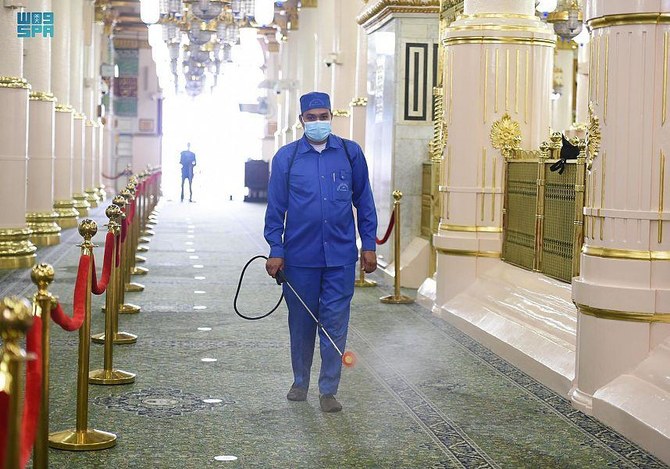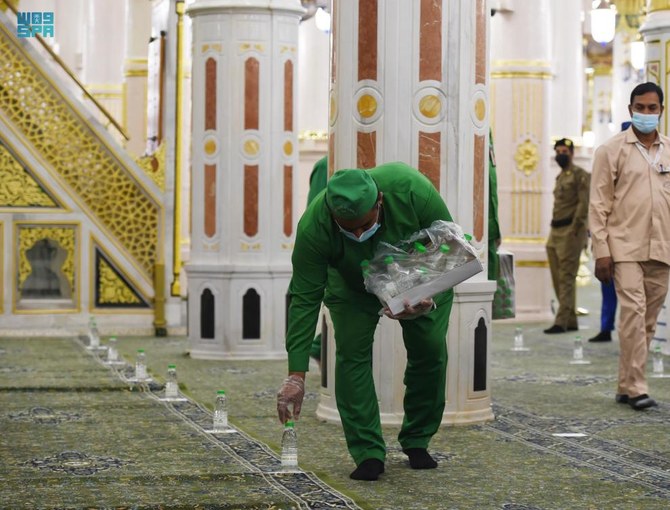MADINAH: The General Presidency for the Affairs of the Prophet’s Mosque is intensifying efforts to prepare the mosque ahead of the holy month of Ramadan in line with COVID-19 precautionary measures.
Only people who have received two doses of a coronavirus vaccine or have recovered from the virus or have had one shot of a vaccine more than 14 days prior to visiting the mosque may visit or pray in the Rawdah, Saudi Press Agency (SPA) reported.
The Rawdah lies between the Sacred Chamber (known as the Prophet’s house), and the Prophet’s Minbar (pulpit).
Each person’s vaccination status will need to be registered on Saudi Arabia’s COVID-19 app, Tawakkalna.
Three million bottles of Zamzam water will be distributed to worshipers and visitors during Ramadan which amounts to 100,000 bottles of water per day, the presidency said.
Each worshipper will be individually presented with dates and water for Iftar and social distancing is to be observed at all times.
Arranging and distributing sahoor meals in the mosque’s courtyards is prohibited, the presidency said.
Itikaf (staying in a mosque for a certain number of days whilst devoting oneself to worship) will be suspended for the second year running due to the pandemic.
Worshippers are also required to use the national parking app “Mawqif” to facilitate their exit from the mosque.
Ramadan 2021 is due to start on either Monday or Tuesday in the Kingdom.
Prophet’s Mosque in Madinah prepares for Ramadan amid pandemic
https://arab.news/ph8nm
Prophet’s Mosque in Madinah prepares for Ramadan amid pandemic

- Three million bottles of Zamzam water will be distributed to worshipers and visitors during Ramadan
- Each worshipper will be individually presented with dates and water for Iftar
Saudi Shoura Council speaker participates in Rome conference

- Event aims to build bridges, promote mutual understanding
ROME: The Second Parliamentary Conference on Interreligious Dialogue — titled “Strengthening Trust and Embracing Hope for our Common Future” — has started in Rome, with the participation of the Saudi delegation headed by Shoura Council Speaker Dr. Abdullah bin Mohammed Al-Asheikh. The event is being attended by heads of parliaments from around the world.
Lorenzo Fontana, the president of the Chamber of Deputies of Italy, praised the body’s significant and vital role, stressing the importance of the conference in building bridges and promoting mutual understanding.
Pesticides workshop held in AlUla

- The workshop was part of a series of different guidance programs and workshops implemented by the National Center for Palms and Dates throughout the year in many regions of the Kingdom
ALULA: A workshop, titled Safe Handling of Palm and Date Pest Pesticides, was held on Friday in the AlUla Governorate. The event, which was organized by the National Center for Palms and Dates, in collaboration with the Royal Commission for AlUla, took place in the agricultural sector of the commission’s headquarters.
The workshop targeted farm owners, agricultural workers, and those interested in the sector. It aimed to raise awareness about safe pesticide use while enhancing efficiency in agricultural pest control in a way that improves production quality while ensuring environmental safety.
The workshop was part of a series of different guidance programs and workshops implemented by the National Center for Palms and Dates throughout the year in many regions of the Kingdom. They bid to support the agricultural sector’s development and enhance sustainability practices.
KSrelief distributes shelter aid in Somalia’s Togdheer region

- The assistance will be distributed in cooperation with the UN World Health Organization to 45 healthcare facilities in northwestern Syria, based on field-identified needs
TOGDHEER: The King Salman Humanitarian Aid and Relief Center recently distributed 1,030 pieces of clothing, 475 shelter bags, and 20 tents to several camps in the Togdheer region of Somalia, benefiting 1,525 families and 9,150 individuals. The assistance comes as part of a 2025 initiative to distribute shelter aid to displaced persons in the African country.
Earlier, three relief trucks provided by the Saudi aid agency arrived on Wednesday in the town of Sarmada in Syria’s Idlib governorate, carrying 20 tonnes of medical aid.
The assistance will be distributed in cooperation with the UN World Health Organization to 45 healthcare facilities in northwestern Syria, based on field-identified needs. The aid supports frontline medical teams in underserved areas, benefiting about 150,000 people.
Elsewhere, the agency distributed 3,000 cartons of dates to families in need in the Shabwa governorate of Yemen, benefiting 18,000 individuals.
Masam Project achieves massive success in Yemen

- KSrelief has implemented 3,438 diverse humanitarian projects across 107 countries, valued at over $7 billion, since its launch in May 2015
RIYADH: Masam, a project launched by the Saudi aid agency KSrelief, has achieved a significant milestone by clearing 67,585,167 sq. meters and removing 500,000 explosives from Yemeni lands since its launch in June 2018.
Items removed include anti-personnel and anti-tank mines, unexploded ordnance, and explosive devices indiscriminately planted to harm civilians.
Demining efforts have dramatically reduced casualties — and allowed displaced people and farmers to return and resume cultivation — earning widespread praise from the UN and international organizations.
The agency has also initiated the Artificial Limbs Centers Project in several Yemeni cities, providing prosthetics and aiding physical rehabilitation to those injured by explosives.
The Masam Project stands as a vital contribution in enabling a safe and dignified life for Yemenis.
KSrelief has implemented 3,438 diverse humanitarian projects across 107 countries, valued at over $7 billion, since its launch in May 2015.
Saudi foreign minister arrives in Istanbul for OIC meeting

ISTANBUL: Saudi Arabia’s Minister of Foreign Affairs, Prince Faisal bin Farhan, arrived in Istanbul on Friday to take part in the 51st session of the Council of Foreign Ministers of the Organization of Islamic Cooperation.
The high-level meeting, to be hosted by Turkiye, will see foreign ministers from OIC member states convene on Saturday to discuss avenues for strengthening joint multilateral cooperation, the Saudi Press Agency reported.
The agenda also includes deliberations on regional developments and their broader international implications, SPA added.
The gathering comes amid heightened tensions across parts of the Islamic world, with participants expected to address key geopolitical challenges and reaffirm the OIC’s collective stance on pressing issues.
























